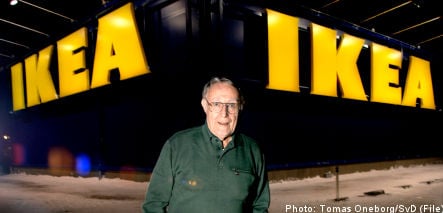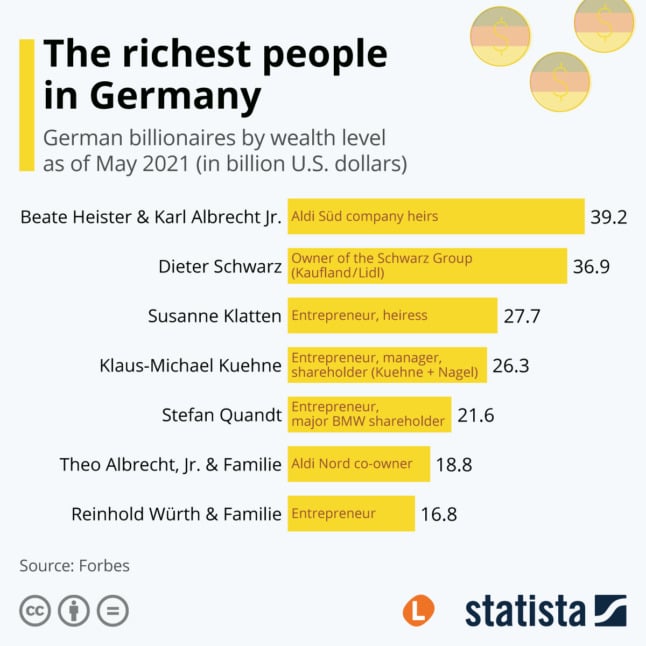A recent ranking by the Veckans Affärer business magazine reveals that the number of Swedish billionaires has been cut by nearly 30 percent in the last year, leaving only 98 individuals who are rich enough to measure their wealth in ten figures.
Collective losses for the richest of Sweden’s rich amount to a staggering 200 billion kronor ($24.7 billion), a roughly 20 percent drop.
But not to worry, those who top the list of Sweden’s richest individuals aren’t likely to have any trouble paying the bills, despite the slump in their net worth.
Topping the list of Sweden’s wealthiest individuals again this year is 82-year-old Ingvar Kamprad, founder of the Ikea household furnishings giant.
Even though his net worth has dropped by about 80 billion kronor since 2007, the remaining 450 billion kronor is nearly five times the net worth of Sweden’s second richest person, putting Kamprad in a class by himself when it comes to wealthy Swedes.
And just who is the comparably modestly well-off individual in the number two spot?
It’s none other than 60-year-old Stefan Persson, heir of yet another well known Swedish retailing giant, Hennes & Mauritz (H&M), which, like Ikea, is built on a successful formula for bringing designer goods — in this case clothes — to the masses.
Persson’s father Erling founded H&M in 1947, but since taking over primary ownership of the firm in 1982, the younger Persson has amassed a fortune now estimated to 90.5 billion kronor.
Sweden’s third richest person is the king of packaging, 82-year-old Hans Rausing, founder of the Tetra Pak packaging giant.
The ubiquitous dairy and juice packages have been a staple in grocery stores and refrigerators for decades, and have helped Rausing achieve a net worth estimated at around 70 billion kronor, but down 24 billion from last year.
The highest ranked woman on the list is 64-year-old Antonia Ax:son Johnson, who now chairs the board of the investment company started by her great grandfather, Axel Johnson, in 1873. Although Johnson’s net worth fell by about 13 billion kronor, she still has 35 billion to spare.
Other notable names on Sweden’s rich-list include several other members of the Rausing, Persson, and Kamprad families; Bertil Hult, founder of the EF language education group (9th place, 12 billion kronor); real estate mogul Fredrik Lundberg (10th place, 11.8 billion); the 31-year-old board chair of the Kinnivek investment group Cristina Stenbeck (31st place, 3.1 billion), as well as her siblings; several members of the Lundin family from the eponymous petroleum and mining company; and Skype founder Niklas Zennström (75th place, 1.2 billion).
Also worth noting are some of the well-known names who have dropped out of the ranks of Sweden’s billionaires since 2007, including former ABB director Percy Barnevik, Ericsson CEO Carl-Henric Svanberg, and Eva Bonnier of the Bonnier publishing group, although several of her relatives remain on the billionaires’ list.
Perhaps the most conspicuous omission in the eyes of many observers of Sweden business elite is the absence of any Wallenbergs, long one of the country’s most influential families.
As the family that started SEB, one of Sweden’s largest banks, and which has ownership stakes in several major Swedish companies through the Investor holding company, the Wallenbergs would seem to be a shoe-in for any list of Sweden’s richest people.
But in reality, most of the Wallenberg family fortune is tied up in family foundations, which in turn owns stakes in Investor.
“They control their companies through foundations which is where all their money is,” Veckans Affärer reporter Ulf Petersson told The Local.
A quick look at the finances of the Wallenberg foundations make it clear that the family has generated a great deal of wealth over the years. According to 2007 annual reports, the three largest foundations had an estimated value of more than 55 billion kronor.
“Because they can’t simply take money out of the foundations and use it for themselves, we haven’t included it in our [net-worth] calculations,” said Petersson, who helped compile Veckans Affärer list of Swedish billionaires.
Of course, the notoriously low-key Wallenbergs likely aren’t too concerned about being left off the billionaires’ list, having learned a thing or two about what it takes to wield influence in Sweden.
“Just because you are the richest doesn’t mean you are the most powerful,” said Petersson.




 Please whitelist us to continue reading.
Please whitelist us to continue reading.